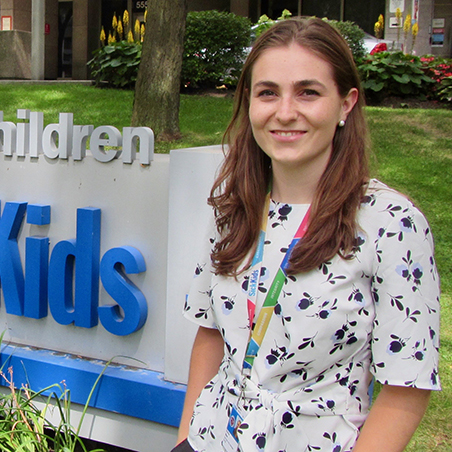Emma Mew
Clinical Research Project Manager, The Hospital for Sick Children
Bachelor of Science (Hons), Neuroscience, 2014
There is something really satisfying … being able to answer a big question with the click of a button.
“I wear two hats,” Emma Mew says. She’s talking about her job as Clinical Research Project Manager at the Hospital for Sick Children in Toronto.
“When I wear my epidemiologist hat,” Emma continues, “I work with a team of methodologists to design international guidelines for how clinical trials should be conducted. When I put on my project manager hat, I supervise a team to make sure we meet our deadlines.”
Emma’s journey to SickKid’s began at King’s where she took the Foundation Year Program’s (FYP) science option. She went on to get her BSc in neuroscience at Dalhousie. Then she went to intern at the World Health Organization on global suicide prevention.
“Our team was trying to quantify the total number of suicides from pesticides globally. I was interested in mental health and I found that when I had the opportunity to see first-hand how the numbers behind health trends inform policies, I became interested in calculating these numbers.”
That work put Emma together with epidemiologists. She knew that that was what she wanted to do. It wasn’t long before she earned her Master’s degree in epidemiology from the University of Toronto.
Emma explains that epidemiologists work with immediate threats to health, such as the flu, or SARS— “We work to identify and control sources of infectious diseases,” she says but they also investigate other diseases.
“We also try to determine what causes non-communicable, or non-infectious, diseases. The classic example is finding that smoking causes lung cancer. The primary role of an epidemiologist is to design and implement research methods to identify causal relationships between exposures and health outcomes.”
That work can lead to policy changes by government and public education.
Emma’s interest in mental health has continued into her current work. One project she and her team are involved in is analyzing the research on adolescent depression, looking for ways to standardize how outcomes from those studies are selected and reported. A standardized system would mean that much less research would be wasted. The project could be a game changer.
“It has the potential to radically improve patient and health system outcomes because it allows all the research to be used and synthesized,” Emma says. “It will prevent research waste, saving money for government and funding agencies, while also improving adolescent mental health outcomes.”
Much of the work of an epidemiologist involves crunching numbers, finding the stories within the stats.
“There is something really satisfying having the numbers in front of you and being able to answer a big question with the click of a button,” Emma says. But she adds, “For me, and this goes back to FYP, having been trained in the humanities, I have to remind myself to look at the big picture.”
And Emma knows that the stories the numbers tell are the stories of people.
Posted July 2018
